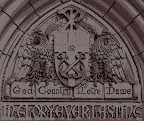Pope Benedict the Transitional?
(read the entire article here)
"Transitional" Popes can make big marks He calls his predecessor John Paul the Great.
So must he be Pope Benedict the Transitional?
For years, the conventional Catholic wisdom held that after John Paul II's lengthy, globe-trotting pontificate, the College of Cardinals would opt for something of a cool-down period by choosing a transitional successor. The translation: an older pope who would closely follow John Paul's agenda.
Sure enough, the princes of the church settled almost immediately last week on 78-year-old Cardinal Joseph Ratzinger, the oldest new pope in 275 years and a dear friend and aide to John Paul.
As if by script, Benedict XVI referred inside the conclave to an expected "short reign," several cardinals said afterward. And during his first Mass as pope on Wednesday, Benedict hit on themes that were central to John Paul's papacy, such as furthering the work of the Second Vatican Council, advancing the often difficult cause of Christian unity and improving relations with other faiths.
"It seems I can feel his strong hand squeezing mine," he said of John Paul. "I seem to see his smiling eyes and listen to his words, addressed to me especially at this moment: 'Do not be afraid!' "
But what does it mean to be a transitional pope?
If Benedict does advance John Paul's agenda, does that mean he cannot craft his own? Even if he does not travel the world as John Paul did, or have the magnetism to attract great crowds when he does travel, does that mean Benedict cannot renew the papacy in other ways?
And even if his reign is only five to 10 years, why can't Benedict accomplish much in a short time?












<< Home